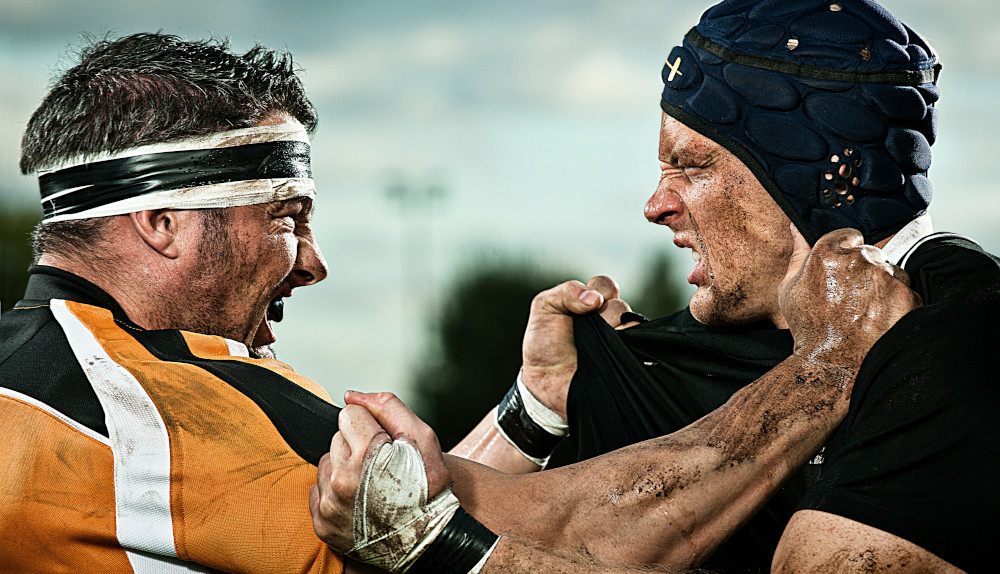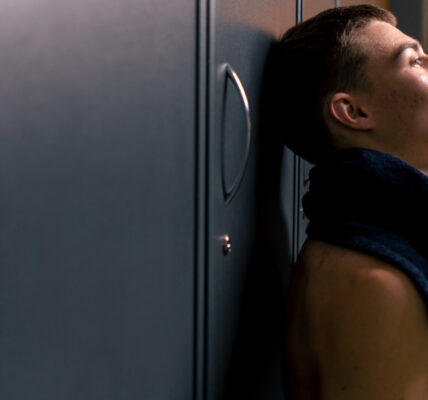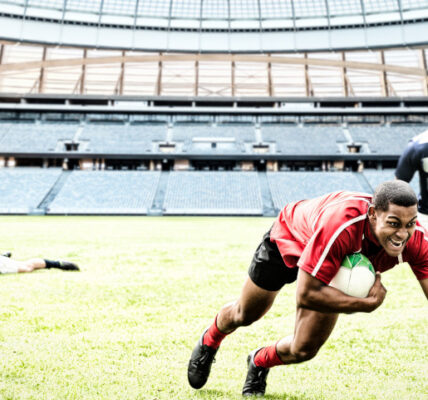There comes a point in every rugby player’s life when the warm-up starts to feel longer than the game. When the body doesn’t loosen like it used to, and strapping your knees becomes as automatic as tying your boots. It happens quietly. Not in one tackle or one season, but over time. A slow erosion of ease. You still know what to do, your hands are sharp, your timing exact, but getting there takes more effort. And then, quietly, a question begins to follow you from the change room to the touchline to the post-match gathering. How long can you keep playing?
For Dean, a 37-year-old flanker still turning out for his coastal club near Port Shepstone, that question has become less of an idea and more of a reality. The shoulder he dislocated three years ago still clicks when he throws a pass. The ankle that used to roll and recover now swells after every match. But he’s still running. Not chasing records, not trying to hold off the younger guys, just running, because he still wants to. And maybe more than that, because he’s not ready to let go of the version of himself that only exists on the field.
Rugby doesn’t offer gentle exits. It doesn’t care if you’ve played for two years or twenty. When the body fails, it fails without warning. And most players aren’t granted farewells or final runs. They just stop. A pulled hamstring doesn’t heal like it used to. A missed step leads to a serious tear. And suddenly, Saturday afternoons are spent on the sideline, watching the team you helped build carry on without you. That’s the hardest part. Not the injury. The absence. The realisation that the game doesn’t need you to continue. But somehow, you still need it.
In smaller towns, Richards Bay, Estcourt, Empangeni, there are men still playing long past the age most stopped counting. Some of them have won club championships. Others have never played above their province. But they all wear the same battered boots and pull their socks up the same way. They’re the ones who arrive early to training, not to impress, but because they always have. The ones who say less at the team talk but speak with how they carry themselves. Younger players watch them carefully, not always with admiration, but with something close to curiosity. As if they’re trying to see what’s keeping them there.
There’s a winger in Margate named Ryno who turned forty last December. He only plays home games now, and never the full eighty. But his left foot can still kick to touch with accuracy, and his spatial awareness makes up for what his legs have lost. He doesn’t chase everything anymore. He chooses moments. But when he commits, he commits fully. After every match, he ices his calves with two grocery bags filled at the clubhouse sink. His kit doesn’t dry until Monday. The young backs call him “Oupa” and tease him about his slow jog. But when he speaks at half-time, no one interrupts. He’s earned that.
Aging out of the game isn’t just physical. It’s emotional. You start to notice things. Players you remember as rookies are now leading warm-ups. The coach is ten years younger than you. The jokes in the change room start to sound different. The music gets louder. You feel slightly apart from it. Not excluded, just aware. And that awareness grows. Slowly, it replaces the fire with reflection. Not sadness, but memory. You remember more than you anticipate. You carry games in your body like a second spine.
Some players try to fight it. They train harder, push longer, deny what their joints are telling them. They play every minute, not because they should, but because they can’t imagine what it will mean to stop. But the body doesn’t lie. The stiffness in the morning becomes pain by the afternoon. And somewhere along the line, they skip a match. Then two. Then a season passes, and no one says it outright, but it’s understood, they’ve stepped away.
 For others, the decision is deliberate. They choose the end. Not with bitterness, but with a kind of grace. They know they’ve given what they had, and they leave while the game still feels good. But even they feel it. On Saturday mornings, when the team’s away, and the sun’s out, and the WhatsApp group is busy. The silence is heavier than expected. Retirement, even voluntary, takes adjustment.
For others, the decision is deliberate. They choose the end. Not with bitterness, but with a kind of grace. They know they’ve given what they had, and they leave while the game still feels good. But even they feel it. On Saturday mornings, when the team’s away, and the sun’s out, and the WhatsApp group is busy. The silence is heavier than expected. Retirement, even voluntary, takes adjustment.
There are different kinds of rugby lives. Not all of them finish in stadiums. Some end quietly on local fields, in front of neighbours and children and dogs barking at the sidelines. Some end at clubhouses where you played your first game. Where you met your wife. Where your son now plays. And in those spaces, the leaving doesn’t feel like a disappearance. It feels like passing something on.
At the Goldrush Casino in Springfield, after a Saturday fixture, a few of the older players from the club gather in the corner near the TVs. They aren’t in kit. Not anymore. But they still talk the game like they’re playing tomorrow. They recall plays from matches years back with startling detail. Who tackled who. Who dropped the ball. Who didn’t show up for warm-up. The banter is sharp, but there’s softness beneath it. They’re not trying to hold onto glory. They’re just remembering how it felt to be in the middle of something.
And that’s why most players keep going longer than they should. Because out there, for those eighty minutes, everything feels clear. The body might hurt, the lungs might burn, but the rest of life, bills, work, family pressure, fades into the background. The game doesn’t solve anything, but it offers something rare, presence. You are exactly where your feet are, and that’s enough.
Eventually, even the most stubborn bodies give in. The boots stay in the garage. The bag gathers dust. The jersey is folded for the last time. And when that happens, it’s not the loss of speed or strength that hits hardest. It’s the silence where the game used to be. But slowly, something else fills that space. Coaching. Supporting. Watching. Telling stories that younger players think are exaggerated but listen to anyway.
So, how long can you keep playing? As long as the body allows. As long as the spirit wants. As long as it still matters when you put that jersey on. And when it doesn’t anymore, or when you know it’s time, you walk away without regret. Because you stayed long enough to know what the game gives, and what it takes. And in that knowing, you find your peace.




